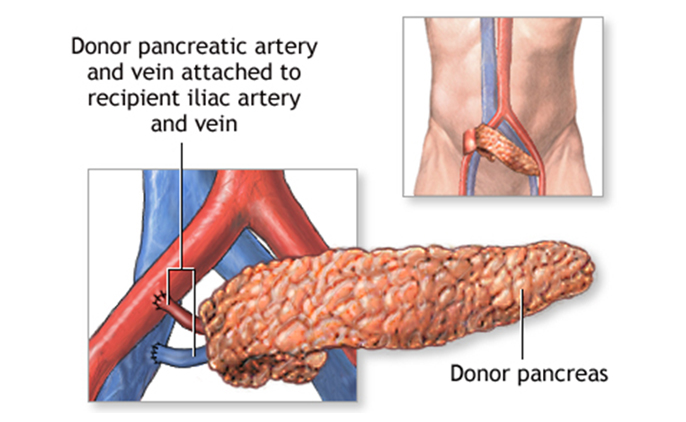Pancreas Transplant
Pancreas transplantation may be an option if other methods of treatment are not effective in diabetes patients. In this procedure, the patient’s damaged pancreas is replaced with a healthy pancreas from a donor. The need for injectable insulin can be eliminated after this procedure.
Indications
- Poor blood sugar levels
- Damaged Kidney
- Type 1 and 2 diabetes
- Insulin reactions
Risk Factors
- Infections
- Blood clots
- Bleeding
- UTI infections
- Transplant failure
Types of transplants
Simultaneous kidney-pancreas transplant
The combined kidney-pancreas transplant is very helpful in the end stage of type 1 diabetes. In this procedure, the damaged kidney is replaced as well as the pancreas is also transplanted to eliminate the need for injectable insulin.
Pancreas transplant
This procedure is very helpful in those conditions when patients have healthy kidneys but have problems maintaining blood sugar and insulin levels.
Pancreatic islet cell transplant
This is the newest technique in which cells that produce insulin are extracted from the donor’s pancreas and injected into the patient’s vein.
Management
- Take medicines as prescribed
- Light exercises
- Avoid sports
- Stay hydrated
- Avoid raw or undercooked foods
- Have a protein-rich diet
- Quit Smoking
Some facts about the Pancreas Transplant
| Number of days taken for initial investigations | 5 |
| Number of days in ICU | 5 |
| Number of days in Room | 5 |
| Follow up days | 25 |
| Total days required to stay overseas for treatment | 40 |
Role of Parishay Healthcare in Planning Pancreas Transplant!
After you contact us, a relationship manager is allocated to you who arranges a teleconsultation with an excellent healthcare provider according to your need. After your consent, we move forward with your untroubled travel arrangements, treatment plan, and follow-up care.
For more information visit our website www.parishayafrica.com


